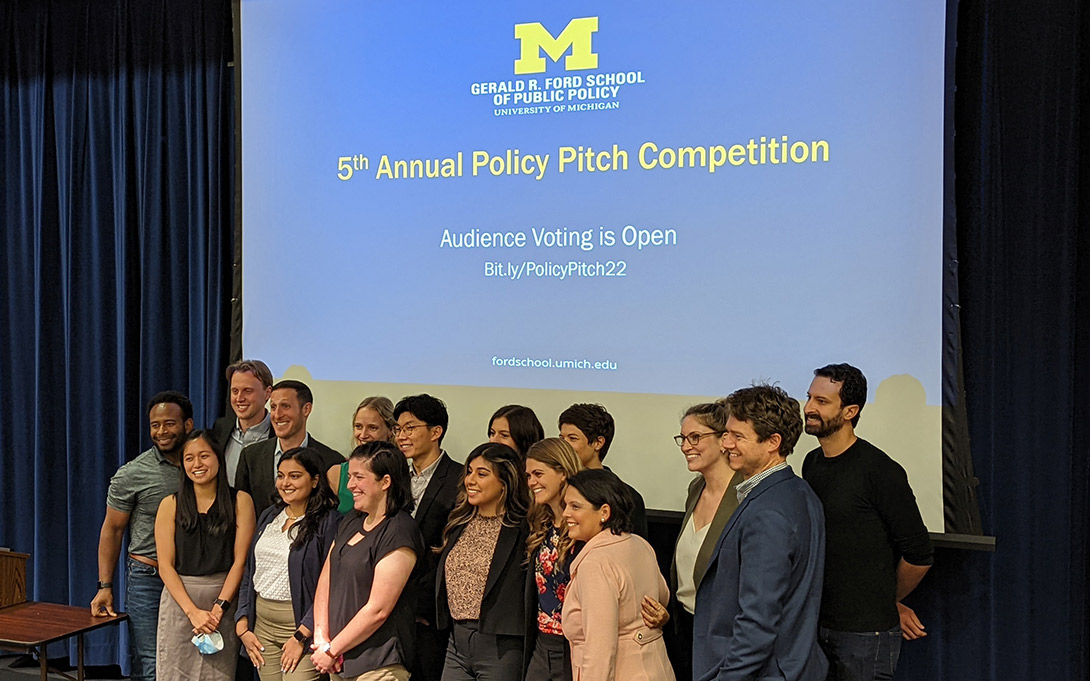
“Here's a truth that bears repeating, ‘Budgets are moral documents.'” So began the presentation of Alex Perez-Garcia (MPP, MBA ‘24) to the 5th annual Ford School Policy Pitch Competition, as she described her summer internship in the Office of Budget for the City of Detroit.
“Thus the keeper of the budget must take the utmost care in ensuring the process is transparent, fair, and does the most good,” she continued. Through her work, she was able to interview stakeholders about the budget development process, garnering compliments, suggestions, and complaints. The final report had a significant policy impact on the organization and included 27 new procedural changes in the process, paving the way for the budget development cycle which began in September. Her experience and presentation garnered first place in the competition.
Judging the event were Trevis Harrold (MPP '17), Government Affairs and Global Public Policy Leader at The Dow Chemical Company, Yousef Rabhi, State Representative from Michigan’s 53rd District, and Anna Walters (MPP '19), Managing Consultant at Guidehouse.
Of Perez-Garcia, they complimented her understanding of municipal government, and the way she made a very technical process engaging.
Chelsea Gaylord (MPP ‘23) remembered her mother commuting to Cedar Rapids, Iowa, from their small town to access the education and economic opportunity that a bigger city could offer. “That upbringing fuelled my interest in crafting policies and initiatives that address barriers to economic well-being, and allows families to obtain a higher quality of life,” she said.
Her summer was spent at the Nowak Metro Finance Lab at Drexel University in Philadelphia, which helps cities design, finance, and deliver initiatives to advance and restructure their economies in more inclusive ways.
Her work included supporting the lab's research teams on financial models, procurement and policy-based initiatives, and assisting with overall lab communications and operations. She helped prepare a major address by the lab director on joint action for sustainable urban development at the first ever G7 Urban Ministers meeting in Germany. She also helped create a memo for leadership in Barcelona, Spain, to document blue economy initiatives in the U.S., providing a baseline analysis for defining key blue economy, industry sectors in communities, and an assessment of seven efforts across the U.S.
Awarding her second place, the judges noted her passion, solid takeaways from the experience, and “how she loves the thriving groups, and being a team leader. And so that's what we're about here: the next future leaders.”
Alexia Carrillo’s (MPP '23) presentation on her work at the Postsecondary National Policy Institute (PNPI) was awarded third place. She spoke of her experience as the first in her family to achieve postsecondary education, and the difficulties she found in navigating the application and financial aid processes. “My experience navigating college as a first-generation, low-income student gave me the perspective that there were two critical things that make it difficult for students to navigate higher ed: accessibility and affordability,” she said
At PNPI she created fact sheets that are posted on their website for Latino, first-generation, and immigrant students. These fact sheets highlighted diverse student populations, but also provided a lens of enrollment rates, degree attainment, and barriers that students face in higher education.
“My team created an environment of encouragement, inspiration, and moving forward, I want to continue supporting students from historically marginalized communities and ensure students not only gain access to higher education, but to make sure that they receive the full benefits throughout and beyond their study.”
The judges saluted how she involved her personal story throughout the presentation, and her pursuit of the next steps in her career.
Caroline Leland (MPP '23) won the audience prize for her presentation on work at the U.S. Environmental Protection Agency (EPA) identifying and seeking to mitigate “Heat Islands” in urban areas. “Did you know that heat is the number one weather-related cause of death in the United States? Heat kills more Americans than hurricanes flooding and tornadoes combined,” she reported.
The EPA’s Heat Island program provides resources and technical expertise to local governments that want to address issues of heat at the intersection of human health and environmental protection. She tied the heat issue to racial and economic equity, noting, “Hotter neighborhoods tend to have more concrete and less green space, and those neighborhoods also tend to be poorer and have more residents of color.”
She rewrote the EPA web page on heat and equity, describing the many risk factors for heat that fall along socioeconomic lines and the connection between redlining and modern-day heat and the cascading consequences for marginalized communities.
Also presenting were Lisa Cheung (City of Philadelphia, Managing Director's Office), Sofia Terenzio (Citizen Advocacy Center), Margo Steinhaus (University of the Virgin Islands RTPark), Radhika Arora (U.S. Department of State - Embassy Seoul), Amy Weber (Tribal Law and Policy Institute), Jonathan Garon (Export-Import Bank of the United States), Christian Neubacher (International Organization for Migration), and Phong Hong (Direct Relief).
